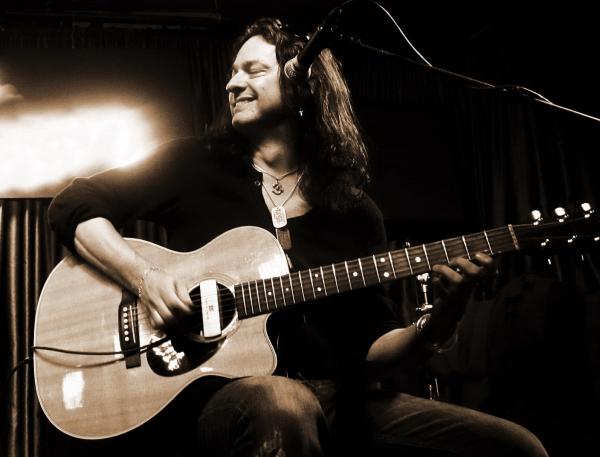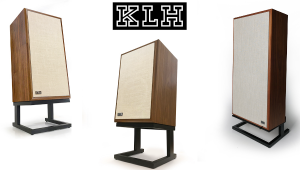Dave Kilminster: The Other Brick Atop The Wall

Here, Kilminster, 53, and I discuss vintage sounds, live quad, and what it’s like to contend with immense pillows of wind while soloing atop a massive wall. That’ll keep you going through the show.
Mike Mettler: What was your idea for the character of how you wanted this album to sound? I like the many, varied layers to each song.
Dave Kilminster: Thank you. I like the “old” sounds. I like analog. I like valve mikes and old preamps. I just love the sound of ’70s records, really.
Mettler: THE TRUTH does have a bit of a timeless feel to it. It could have come out in the ’70s just as much as yesterday. Was that your intention when you were making it?
Kilminster: Yeah, it was. There is a little bit of a keyboard sample in there that’s kind of a mellotron thing, but it’s so sparse that you don’t really realize it; it’s just 2 or 3 seconds. I like to avoid keyboards in general, since I had a lot of keyboards on the previous album [2007’s Scarlet, later reissued in 2012 as Scarlet – The Director’s Cut]. I also didn’t want to use one of the whammy pedals, because that straightaway makes it sound like it’s from a certain period.
I just wanted to keep it as real as possible. All the backing tracks were the three of us [Kilminster, drummer Pete Riley, and bassist Phil Williams] in a room together. When I did all the guitar overdubs, the solos, I did them all in the “live” room, which is the way it’s supposed to be. (chuckles) Nowadays, a lot of people are tracking their guitar solos in the control room, and I’m like, “What are you doing in there?”
Mettler: Yeah, in the early days of the rock era, artists were forbidden to be in the control room at all, and now a lot of people go in there and plug in DI. I like to get the sense of people playing together. You three guys have put a lot of years in together, and I want that feeling of interactivity captured on record.
Kilminster: Exactly, exactly. And that’s the sound I was going for — ’70s records. There was also some great stuff in the ’80s and the ’90s — I mean, [Jeff Buckley’s] Grace (1996) is such an amazing-sounding album. He’s my favorite singer of all time. And that’s the guy who used to work on the Led Zeppelin records as well [Glyn Johns]. It’s all kind of related.
So I wanted to get that sound. I got in a real string quartet and I scored the strings; the charts were handwritten. I wanted the personality of that. People don’t even handwrite letters anymore; everything is typed. Everything looks the same. Auto-Tune has taken out all the personality of the singing. And that’s one reason why the album is called the TRUTH, because there’s none of that stuff on there. There’s no sampling, there’s no Auto-Tune — just a couple of guys in a room. I’ve obviously overdubbed quite a few vocal harmonies, though. (laughs)
I had so much fun doing the harmonies on this album. Someone had put “Killer Queen” on my Facebook page — just the vocals and the guitar solos — and it is incredible; absolutely incredible. I’ve always loved their harmonies anyway, but that’s a piece of art.
Mettler: I have to agree with you there. What would you consider your benchmark records from that era, the ones you think sound the best?
Kilminster: The first five albums by Queen are just amazing, but I think I got A Night at the Opera (1975) first, and that sounds gorgeous. It’s warm and fat, and it’s got all the frequencies you could ever wish for. “The Prophet’s Song” has one of my favorite Brian May solos in it. It’s a really, really simple solo with a wah pedal. It’s got so much energy.
Mettler: Roger Waters does live quad on all of his tours. Does that enter into what you have to do onstage? Are you cognizant of how the set gets mixed?
Kilminster: Unfortunately, we’re probably the only people in the stadium who are completely unaware of it. Everyone’s wearing in-ears, and we just get the click track. To be honest, you can have whatever you want in your ears, but I tend to keep everything very, very sparse.
I feel envious of the people who came out to see The Wall tour. I got to hear some stuff during soundcheck, when I’d go out into the arena. It’s just incredible. It’s like you said about listening to Steven Wilson’s The Raven [That Refused to Sing (and other stories)] in 5.1 — once you experience that kind of sound, then anything else just doesn’t sound right.
I’m very intrigued to hear the film of The Wall concert, actually. I think Roger’s trying to get it to go to cinemas, like Led Zeppelin did — which makes complete sense, because The Wall, it’s, it’s so… huge. Watching it on a laptop just doesn’t give it any justice. [Roger Waters The Wall premiered at the Toronto Film Festival on September 6, 2014. Currently, no official theatrical release date has been set.]
Mettler: Speaking of huge moments — one of the biggest ones during the entire show is when you’re standing at the very top of the wall itself, doing the solo on “Comfortably Numb.” How do you compose a solo for one of the most iconic songs in the Pink Floyd canon?
Kilminster: I try to treat the music with the utmost respect and make the fans happy. If I were a fan, what would I want to hear? I’d want to hear that solo played as close to the original as possible, with as much energy, passion, soul, and emotion that I can squeeze into it.
Mettler: And there’s truly no hiding when you’re up there. Did you ever worry about falling off the wall?
Kilminster: Well, yes. (chuckles) There was no safety harness. I literally just stood on a platform that high in the air, which is kind of scary. It was very, very windy during the outdoor show we did in San Francisco [May 11, 2012] — the wind was whipping up off the Bay, and it was actually moving the wall. I could feel the wall moving and hitting the platform that I was standing on, trying to deal with 50,000 people looking at me while I’m trying to play the solo properly.
Mettler: Wow, no pressure on you there, Dave. What was your personal highlight of the show?
Kilminster: I tend to like that track, what is it… (sings) “dirty woman”…
Mettler: “Young Lust.”
Kilminster: Yeah. It’s a little bit more funky, a little bit more syncopated. That’s generally my taste. Obviously, “Comfortably Numb” is a highlight, but there’s so much pressure on it that my very favorite part of the show was always the very last chord of that solo. (laughs) The lift would go down and I could go, “Ahhhh.” And then I could enjoy the rest of the show.
Mettler: You’ve been able to play a good bit of the Pink Floyd catalog over the years, including all of The Dark Side of the Moon. What are your favorites?
Kilminster: “Any Colour You Like” was always nice. It’s slightly funky and messy, with all the chord progressions. And “Have a Cigar” — it’s kind of got that funky thing as well. I would have loved to have sung that one, since it’s right in my singing range. That’s the one thing I missed on The Wall tour, because I sang quite a lot on the Dark Side tour. But Roger wanted to replicate the whole bunch of singers who were on The Wall, so we did that with full backing vocalists and Robbie [Wyckoff], who was doing David [Gilmour]’s vocal parts. (pauses) It’s weird. It’s kind of like you’re living a dream on tours like these, really.
Mettler: And you get to play the soundtrack to that dream.
Kilminster: Yeah, yeah. I’ve just been so lucky. There isn’t a better job in the world for me, what I’ve been doing for the last 10 years. Obviously, I’d love to get out there and play live again. I don’t need stadiums and arenas and that stuff; I’m quite happy playing smaller places. Just playing music live — that’s where I’m happiest.
A longer version of this interview appears on Mike Mettler’s own site, soundbard.com.





























































